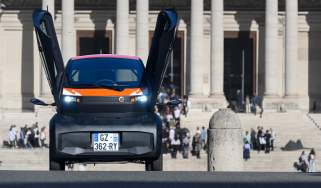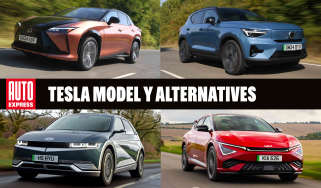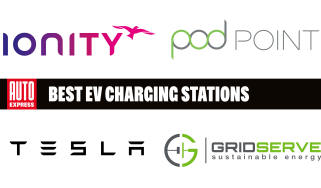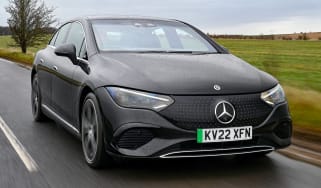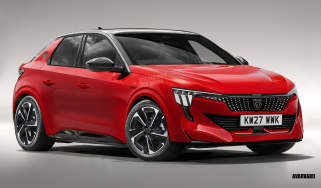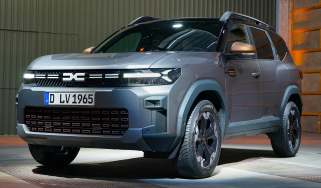Should I buy an electric car? The pros and cons of owning an EV today
Wondering if it’s worth buying an electric car? Here’s everything you need to know

The UK is in the process of a full-blown electric vehicle (EV) revolution. Improvements in range, lower prices and the continued expansion of the charging network mean that 2024 is the best year yet to buy an EV. And things are only going to get better.
Of course, there are still lots of pros and cons to consider when deciding if it’s worth buying an electric car – but our guide is here to help.
Electric cars still make up a small percentage of all cars sold in the UK but thanks to tightening legislation both at home and abroad, the balance is already shifting.
The 2035 ban on the sale of new petrol and diesel cars might gain a lot of headlines but in practice it may not even be particularly significant for car buyers. In the UK, the ZEV mandate dictates that 80 per cent of new cars sold will be zero-emission by 2030. This means manufacturers are under pressure to sell more EVs than ever before, which in turn means there are great EV deals and offers to be had.
Similarly, while prices for EVs remain higher than those for their internal combustion counterparts, economies of scale and manufacturers’ keenness to sell more zero-emissions vehicles mean more affordable fully electric cars are available than ever before. The recent influx of Chinese brands to the European market is particularly good news for those on a tighter electric car budget.
Plug-in hybrid cars remain a popular halfway-house option in many brands’ lineups, offering zero local emissions running around town with the flexibility of a petrol engine for longer distances. These can make a lot of sense in more rural areas – but with modern EV technology continuing to improve, range anxiety is becoming less of a factor even away from towns and cities.
Hydrogen-powered cars are nowhere near as popular as EVs or hybrids but offer an interesting alternative. These cars use a hydrogen fuel cell to power an electric motor, with the fuel stored in a pressurised tank that can be filled at a dedicated refuelling station. Range is generally on par with conventional internal combustion cars but water is the only exhaust product. Sadly, with high list prices and a small network of hydrogen fuel stations, hydrogen-powered cars remain a niche solution; for now at least, electric vehicles remain the most viable alternative-fuel option.
Figuring out if it’s worth buying an electric car is a daunting task. There are lots of pros and cons to consider, but don’t worry: this article is here to help you make the right decision.
|
Electric cars: pros and cons | |
| Pros | Cons |
| • Zero emissions | • Charging points |
| • Buying incentives | • Charging time |
| • Low running costs | • Battery range |
| • Tax benefits | • Purchase price |
| • Comfort | • Driving fun |
| • Acceleration | • Depreciation |
Reasons to buy an electric car: the benefits and considerations
Electric cars bring tangible benefits over petrol and diesel models and here are the key ones to consider from cost savings to the driving experience.
Zero emissions
The big attraction of an EV is the fact you are doing mile after mile of emissions-free driving. When you're on the move, the EV system is a 'closed loop', meaning that the battery drives the electric motor and powers all of the on-board electrics, but doesn't produce any waste material.
There are arguments that identify the production of electric car batteries as environmentally damaging, and it is true that EVs often emit more CO2 in production than petrol or diesel cars.
However, according to a research briefing published by the House of Commons Library in 2023, citing 2020 data from Bloomberg New Energy Finance, the ‘lifecycle CO2 emissions’ of a medium-sized electric car – including production and 250,000km of use – are between 18 and 87 per cent lower than for an equivalent internal combustion car. The gap in total emissions is smallest in China where many EVs and batteries are produced locally, but much larger in the UK.
The only time an EV pollutes other than when it is finally scrapped – a process that increasingly sees batteries at least partially recycled or repurposed – is when it's being charged. Even then, emissions are traced back through the National Grid to the power source. If that happens to be a renewable source (solar panels/wind farm/wave power), then you could genuinely be contributing to lower harmful emissions into the environment. Even if power is sourced from nuclear, gas or coal sources, the levels of harmful byproducts produced when charging your car will be a mere fraction of the power station's overall pollution output.
Buying incentives
Until quite recently, the Plug in Car Grant (PICG) was a major plus point when buying an electric car. The PICG originally saw £5,000 put towards an electric car purchase, dropping to £3,000 in later years, but in 2022 the Government axed the scheme completely as electric cars became more popular. Grants of varying sizes are still in place for electric wheelchair accessible vehicles, motorcycles, small and large vans, small and large trucks, and taxis.
Many manufacturers responded to the removal of the grant buy offering their own discounts at the time – and the good news is that most remain eager to tempt buyers into EV ownership. Zero per cent PCP deals are now very common, meaning now is a good time to buy a brand new electric car so long as you can stick to a mileage limit. Some manufacturers will even offer a promotional deposit contribution.
Some manufacturers – including Audi, Lexus and Toyota at time of writing – offer a complementary home wallbox to sweeten the deal, while others offer these at a discounted rate.
It is also worth noting that while there is no longer a Government grant to help with the installation of a charger on your driveway or in your garage, grants do exist for renters and flat owners, as well as those with on-street parking. It’s definitely worth checking to see if you are eligible.
Low running costs
Even taking into account higher energy prices, the day-to-day running costs of an EV are generally lower than for an equivalent petrol or diesel car.
It's common for an EV to be charged overnight ready for a day's use, so EV owners with flexible electricity tariffs can use electricity at a lower unit rate than they would be during the day. Some energy providers offer EV-specific tariffs to help you maximise these savings.
Those who rely more on the public charging network will pay more – especially when using the fastest chargers – but many local authorities offer discounted charging via their own networks.
According to research published by the Energy and Climate Intelligence Unit in 2023 based on some of the most popular EVs and their owners’ charging habits, the average electric car is around four times cheaper to fuel than its petrol equivalent.
Tax benefits
If you're buying privately, an EV costing less than £40,000 qualifies for free road tax. Cars over that price cost £340 a year in road tax for the first five years, but after that they are also road tax exempt.
This arrangement is set to change however, with all electric and low-emission cars set to effectively move up a tax band from April 2025 onwards. The current Band A in the graduated VED system will be ditched and electric cars will be liable for the lowest first-year rate of tax, followed by the standard rate thereafter. This is currently £190 but is likely to change for 2025.
Electric cars make a lot of sense if you are a company car user too: all electric cars are subject to a temptingly low 2% BiK tax rate that’s frozen until at least 2025. This can bring huge savings for company car drivers choosing EVs and has been a big driver of electric car sales in recent years - cars that are now appearing on the used car market in good numbers and forcing used EV prices down.
It’s also worth remembering that pure EVs are exempt from the London Congestion Charge, as well as all forms of the ULEZ and LEZ zones in cities across the UK.
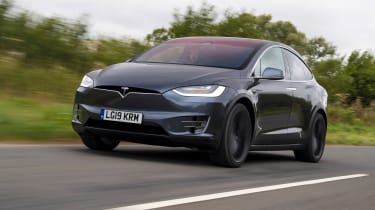
Comfort
As an electric motor only makes a faint whirring noise, cabin comfort is a major EV forte. You only really have to contend with tyre, wind and road noise on the move, and if you're around town all three of these will be pretty minimal. In fact, EVs are so quiet that manufacturers are required to fit sound generators to ensure pedestrian safety.
Many EVs are designed to be comfortable around town, so while the suspension needs to carry the weight of the batteries, there's a degree of comfort to the ride that complements the lack of noise.
Acceleration
You don’t need a Tesla or Porsche Taycan to enjoy the benefits of electric motor performance; thanks to the instant torque delivery of an electric motor, most EVs feel surprisingly quick away from the lights. Simply press the accelerator, and the car will sprint forward on a wave of torque.
Reasons not to buy an electric car: drawbacks and considerations
Electric cars aren’t for everyone. They’re becoming more suitable for more people all the time but it’s important to go into any EV purchase with your eyes open…
Charging
Getting used to electric car charging rather than filling your car with fuel is perhaps the biggest change that EV ownership brings. An adjustment to the traditional routine of car ownership is required and that can take some getting used to.
Pretty much every EV on sale comes with a three-pin domestic plug so that you can charge via the mains but this is intended as a last-resort solution given the usual slow rate of charge. A smaller battery will probably charge overnight using this cable, but larger batteries will take even longer in some cases.
An AC charging cable is also usually standard, intended to be used on slower public chargers or a home wallbox. These split the difference between the three-pin charger and a public rapid charger – the latter of which always has its own cable attached.
Wallboxes are the best solution for those with off-street parking (and suitable home electrics) – simply park up, plug in and return to a fully charged car for every trip.
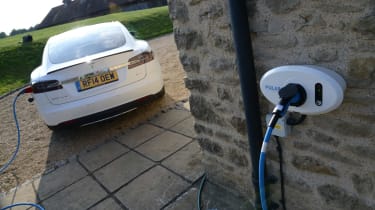
However, if you park on the street, charging becomes more of an issue. Some streets in larger cities will have chargers in lampposts but this is rare; for most people without a driveway or garage, some local research will be required to figure out how best to stay on top of charging without resorting to expensive rapid charging.
Car makers are doing their bit to help with EV charging. Tesla has a network of Supercharger stations across the UK that offers fast charging both for both Tesla models and, in some cases, non-Tesla models. Elsewhere, Nissan and Renault EV dealerships offer fast-charging for EV owners on-site, although that only really helps if you happen to be near one of these sites, which are usually on industrial estates on the outskirts of major cities.
The other option is to sign up with a charging provider such as Pod Point, Ionity or Octopus Energy. For a monthly fee, this gives you access to charging points and dedicated parking bays – both on-street and in larger car parks – across the UK. Contactless payments are also widely available on all the major networks, so you can pay as you go if you prefer. Some networks also use an Oyster-style pre-loading system.
The cheapest option for many will be to sign up for membership of a charging network operated by local authorities. In Scotland, for example, the ChargePlace Scotland network operates in a similar way to the private equivalent but with more reasonable rates across its network of slow- and fast chargers.
Charging time
Drivers have become used to the habit of simply filling a car up with fuel as and when needed. However, you can't apply the same regime to an EV. If you do, you'll be suffering from extra-long journeys as you stop to charge your EV up over a prolonged period. In this regard it's more the perception of EVs that needs to change, rather than the cars themselves. Remember that if you don’t do many miles and have an EV with a good range, charging could be a weekly event rather than something you have to do every day.
Owning an EV involves some forward planning, especially on longer trips; and as long as you keep your EV plugged in every time you're parked, especially overnight, it should have enough battery life to get you to your destination on all but the longest journeys.
On a long-distance trip, a charging stop may well be required – but don’t forget you may well have needed to stop anyway. With modern EVs and chargers, a 30-minute top up may be all that’s needed.
Battery range
Another limiting factor that will stop some from buying an electric car is range anxiety – the fear that you either won't get to your destination without having to charge, or that you won't be able to charge when you get there.
Current EV technology means that a workable range of around 150 to 300 miles is typical but this is improving as technology continues to develop. It’s worth not getting too hung-up on range, however: a larger battery may go further but will take longer to charge and – especially in the biggest electric cars – be heavier and therefore less efficient. You may be better with a smaller, cheaper battery that charges more quickly and will help the car get more miles to each kilowatt hour.
In reality, if you're able to plug an EV in regularly then range anxiety shouldn't be an issue. The average driving commute in the UK is around 10-15 miles, so any EV is more than capable of covering the journey to work and back without needing to be charged up.
Purchase price
Electric cars are still relatively expensive, carrying a premium over an equivalently sized petrol or diesel powered car. However, the gap has narrowed in recent years and the influx of affordable models means EVs continue to become more attainable.
The issue is less pronounced if you are a fleet user, but it’s worth doing the sums if you’re a private buyer looking to buy a brand new electric car instead of a petrol or diesel car. You may have to do quite a few miles to make the extra cost of an electric car back in fuel savings.
EV depreciation
Perhaps a larger issue than outright price is depreciation, which tends to affect EVs much more than most petrol or diesel cars. This can be attributed in part to the speed of development of EV technology, with newer, cheaper, more efficient and longer-range models arriving every year.
Concern about EV battery life – a similar phenomenon to that encountered with second-hand smartphones but on a much larger scale – is also a factor here. Electric car batteries will inevitably lose capacity as they get older, with certain charging habits and use-cases causing faster degradation than others. Replacement units are hugely expensive, but most electric cars are too new for this to be an issue. Modern batteries should last somewhere between 10 and 20 years - about as long as an internal combustion engine.
It may be that depreciation figures improve as battery technology (and longevity) improves, prices come down and market share increases, but we’ll have to wait to find out.
Depreciation is bad news for those buying a brand new electric car with their own money but not really a concern for company car users. It does mean there are lots of deals to be had on the nearly new and used markets, however. We certainly wouldn’t be worried about taking the plunge on an ex-fleet electric car with low miles if someone else had taken the sizeable initial depreciation hit.
Driving fun
There's no escaping that the heavy batteries of an EV do dull the driving experience somewhat. In addition, the lack of engine noise from the electric motor takes away some of the driving thrill for people who like to get involved in what they're driving. In addition, the direct drive and lack of gearbox also detracts from the driving fun, so enthusiasts still feel rather numb at the thought of EV driving.
The good news is that many manufacturers have listened to criticism from driving enthusiasts and have started to introduce some genuinely sporty electric cars, with highlights including the Abarth 500e, Alpine A290, Hyundai Ioniq 5 N and MG Cyberster.
|
Electric cars: pros and cons | |
| Pros | Cons |
| • Zero emissions | • Charging points |
| • Buying incentives | • Charging time |
| • Low running costs | • Battery range |
| • Tax benefits | • Purchase price |
| • Comfort | • Driving fun |
| • Acceleration | • Depreciation |
Get all of your electric car question answered by our expert EV guide...
Your electric car questions answered
- Electric car FAQ
- Should i buy an electric car?
- What’s the best way to buy an electric car?
- Is a hybrid, plug-in hybrid or electric car right for me?
- Should i buy a used electric car?
- Can i get a plug-in car grant?
- How is electric car range calculated?
- How much do electric cars cost to charge?
- How much do electric cars cost to run?
- How long do electric car batteries last?
- What happens to old electric car batteries?
- Should i get a heat pump on my electric car?
- What are fast charging and rapid charging?
- Should i get a home electric car charger?
- Can i tow with an electric car?
- Is wireless electric car charging the future?
- What’s the history of the electric car?
- What’s the future of the electric car?






